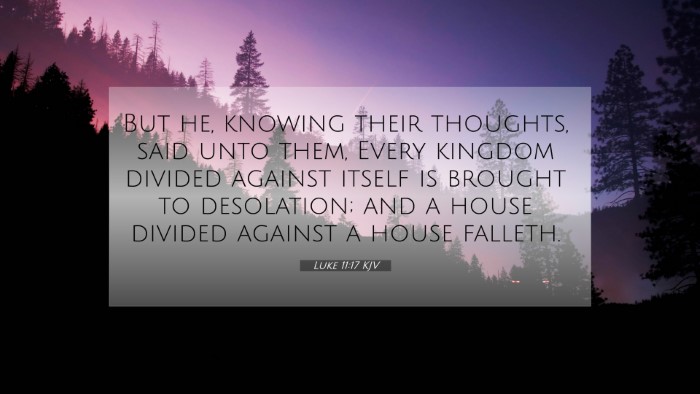Understanding Luke 11:17
Luke 11:17 states, "But he, knowing their thoughts, said unto them, Every kingdom divided against itself is brought to desolation; and a house divided against a house falleth.” This verse highlights the importance of unity and the inevitable downfall that occurs when division arises. The insights gathered from public domain commentaries provide a richer understanding of this profound message.
Summary of Interpretations
This verse is part of a larger discourse where Jesus responds to accusations made by the Pharisees. It serves as a significant teaching moment about the dangers of discord and the reality that division leads to ruin not only in kingdoms but also in households and communities.
Insights from Commentaries
- Matthew Henry: Henry emphasizes that Jesus, being aware of the thoughts of the Pharisees, uses this moment to illustrate the fallibility of their reasoning. The assertion that He casts out demons by Beelzebub is critiqued, highlighting that opposing forces cannot effectively work together without leading to chaos.
- Albert Barnes: Barnes notes the logical foundation of Jesus’s argument, asserting that it is absurd for Satan to cast out Satan, as this would lead to destruction rather than victory. He explains that a divided kingdom cannot stand, reinforcing the idea that unity is crucial for strength and survival.
- Adam Clarke: Clarke expands on the familial aspect, indicating that the same principle applies within households. If members are at odds, the resultant disunity leads to their collective downfall. He also points out that this warning serves as an admonition against internal strife among believers.
Thematic Connections and Cross-References
To deepen understanding, it is beneficial to explore bible verse cross-references that reinforce the themes presented in Luke 11:17. Here are some relevant standards:
- Matthew 12:25: Similar to Luke 11:17, this passage underscores the same principle about a divided house and its consequences.
- Mark 3:25: This verse echoes Jesus' statement regarding division, further linking the concept of household stability to strength in unity.
- James 1:8: A double-minded man is unstable in all his ways, emphasizing the importance of having a singular focus and purpose.
- 1 Corinthians 1:10: Paul urges believers to be perfectly united, highlighting the church's need for cohesion and the dangers of division.
- Galatians 5:15: Paul warns that if believers bite and devour one another, they could ultimately destroy each other.
- Philippians 2:2: Paul encourages believers to be like-minded, emphasizing the importance of unity in purpose and spirit.
- Psalm 133:1: "Behold, how good and pleasant it is for brethren to dwell together in unity!" This Old Testament verse highlights the virtue of unity among people.
- Colossians 3:14: Love is described as the bond of perfection, reinforcing the idea that love fosters unity.
- Ephesians 4:3: Paul calls for the endeavor to keep the unity of the Spirit in the bond of peace, connecting back to the teaching of Jesus to maintain unity.
- Proverbs 6:16-19: This passage addresses the Lord's disdain for discord among brethren, further showing the seriousness of division.
Practical Application and Reflection
When reflecting on Luke 11:17, believers are called to examine their own lives and communities. The commentary insights and biblical cross-references encourage a deeper engagement in promoting unity and healing divisions.
By utilizing tools such as a Bible cross-reference guide, one can conduct a comprehensive bible cross-reference study to better understand how themes of unity versus division unfold throughout the scriptures. This not only enlightens personal understanding but also prepares believers for discussions and teachings in communal settings.
Conclusion
Luke 11:17 stands as a timeless reminder of the necessity for unity within the body of Christ and among all people. The insights drawn from commentaries elucidate this principle, reinforced by the interconnectedness of various scriptures. By embracing these teachings and engaging in systematic cross-referencing of biblical texts, believers can grow in their understanding and practice of unity in both spiritual and communal realms.











